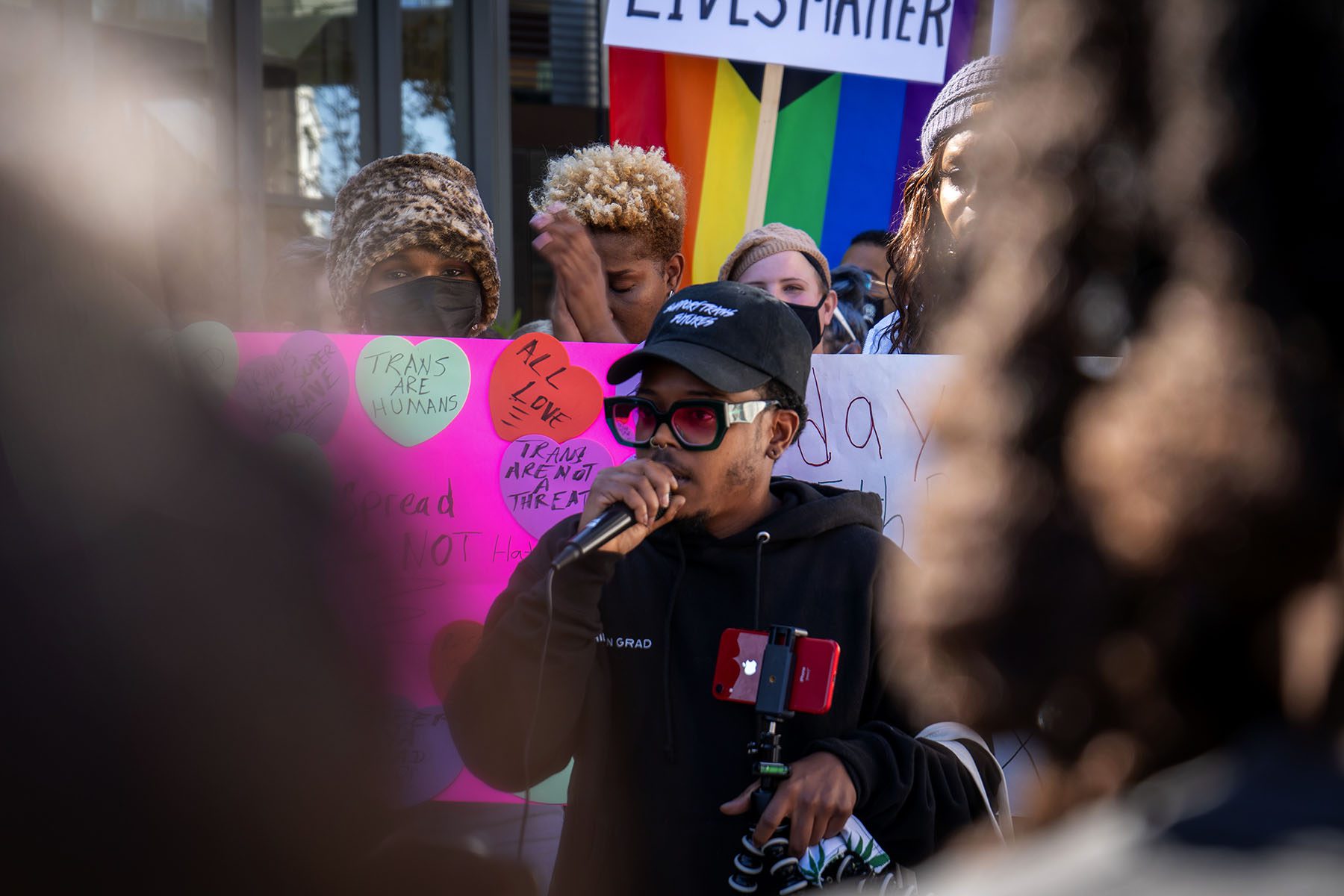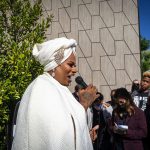A week after Dave Chappelle’s “The Closer” hit Netflix, Adrian Birch* resigned. It wasn’t that as a transgender person they found “The Closer” hurtful and offensive, though they did — the special spent more than 40 minutes misgendering transgender people, including a friend who died by suicide. It’s that Birch didn’t think the company would make it possible for trans employees to comfortably return to work once it aired.
“I’d rather work at a company that just kind of ignores trans people, as opposed to one that does 1,000 nice things and then occasionally punches me in the face,” they said. (Birch has asked that their real name be withheld from publication because they fear harassment.)
Birch’s decision to resign represented an outsize loss for Netflix, and not just because Birch was among a fraction of trans employees. In 2015, Birch co-founded Netflix’s Trans* Employee Resource Group (ERG), which started as an informal support lunch for marginalized employees. But, as the group grew, its role did, too, with Netflix tasking the group with duties typically reserved for human resources departments.
B. Pagels-Minor, who is nonbinary, remembers their first days at Netflix in March 2020 as distinctly different from past jobs.
“When I first started it was phenomenal,” they said. “It was the first time I’d ever been at a place that seemed to understand pronouns and seemed to care about me as a whole person and making sure that I was successful.”
It was a feeling shared by many transgender employees, according to multiple sources. Still, much of that culture had been developed not by the company’s human resources department, but by the labor of transgender staff hired for other jobs, they told The 19th. At the height of their involvement, 50 percent Birch’s time at Netflix was going to the ERG, they said.
The Trans* Employee Resource Group, whose members have publicly faced off with Netflix, could have have advised the company on “The Closer,” or even the aftermath of its release, in which the company defended the special and punished two transgender employees who publicly disagreed with it. The group, however, was not consulted, members said.
Netflix did not respond to multiple requests to comment for this article.
The group has been critical to many internal policy decisions and even has had some sway on content. In 2015, when Birch co-founded the ERG, the issues facing transgender employees at Netflix were myriad, they said. Like many workplaces, Netflix wasn’t designed with a transgender workforce in mind.
“The challenges would be simple things like trying to figure out how to get your name changed in the kind of systems that exist there, getting paperwork dealt with, finding access to health care that you needed,” Birch said.
According to Birch, the company offered flexible scheduling and support for employees navigating divorces, pregnancies and sick kids. There was less consideration for a trans employee who needed to rest after a common gender-affirming medical procedure, Birch said.
Netflix’s transgender employees started talking about how to change that culture, how to talk to managers and human resources about better health care options or routes for support when anti-trans jokes were made in the workplace. At the time, the group was less formal and more social, a place for employees looking for community in the company to meet.
“They were just kind of like groups of employees that were advocating their needs inside the company,” Birch said. “It was an opportunity for all of us to get together, talk to each other, have lunch, and chat about our daily struggles of being trans in the workplace.”
They were successful in creating community and making change at Netflix, Birch said. The group blossomed from a handful of employees to a Slack channel of 40 people. Because of the ERG, health benefits for transgender people at the company improved. Onboarding included questions about pronouns.
In 2017, when the company added “inclusion” to its list of core values, the Trans* ERG — along with other identity-based groups — became a formal part of Netflix with funding and the full weight of HR behind it.
“I was very excited, and I think we all were because we’re like, ‘Hey, we can go back to doing the things that we’re experts in,” Birch said. “We were doing a lot of educational labor. We were kind of taking on that sort of inclusion education piece that I think a lot of HR companies can do.”
As Netflix hammered out trans-inclusive policies, its trans workforce grew from a handful to dozens fueled by referrals from trans employees excited to be working at a place nurturing trans talent, according to Field and Birch. While the 2015 U.S. Transgender Survey showed that transgender people experience unemployment at three times the rate of the national average (15 percent) and that 39 percent of trans people lived in poverty, Birch was making half a million dollars a year.
Terra Field, a Netflix software developer who posted the viral twitter thread that alerted the public to the contents of “The Closer,” said that 25 percent of her job was devoted to the Trans* ERG.
“I think at first there was a sense of, ‘Oh well this is just for these people, and it’s like a voluntary thing, and maybe it’s almost like a social thing,’” Field said. “It’s become so much more than that. And that company benefits from the labor.”
Still, trans employees are clear that the ERG serves a powerful purpose in the company and for themselves. They did the work voluntarily. It was deeply meaningful to help change the culture at Netflix, they said.
“We did a ‘Trans 101,’ we did ‘how to be a good colleague to trans people,’” Field said. “We’ve done plenty of events and outreach and all of that stuff, and a lot of it really stuck.”
Still, they felt that wasn’t always reaching the people in charge of content at the company. In 2018, Netflix released “Girl,” a film about a transgender dancer played by a cisgender actress. The movie fixates on the 15-year-old’s gender dysphoria, showing graphic images of her genitalia and culminates in a scene where she self-harms. The film was widely-condemned by queer critics.
After it hit the platform, the Trans* ERG jumped into action. Birch said the group made a decision to pursue relationships with those making content decisions at Netflix. They were successful. While “Girl” remained on the platform, the company added warnings and context to the film.
The Trans* ERG tackled another content challenge the following year. In 2019, Chappelle released his special “Sticks & Stones,” which was also criticized as transphobic. Field wrote in a blog post that the Trans* ERG and an ERG representing Black employees came together to brainstorm how to deal with the fallout.
“It was an incredible moment of allyship between our two ERGs, the I&D team, and the content folks at Netflix — and we came out of that meeting feeling like we had a path forward for building greater understanding of the impact content has on our community,” Field wrote.
The two events marked a shift for the Trans* ERG. It spoke to the growing power of the ERG, with it weighing in on content decisions. It also sparked critical internal dialogues at Netflix, Field said. Netflix’s context teams lacked trans people, and that had been laid bare.
ERGs are increasingly common at large companies. Tech companies and newsrooms from The New York Times to USA TODAY rely on ERGs as important venues for employees to raise concerns and find community.
Like Netflix, USA TODAY recently found itself in the position of having to answer to its queer ERGs over content decisions.
On May 22, the newspaper published an op-ed by Chelsea Mitchell, a plaintiff suing the Connecticut Association of Schools for allowing transgender girls into track competition. The op-ed misgendered Mitchell’s trans competitors as boys, echoing the dehumanizing language used to talk about trans girls used by the Alliance Defending Freedom, an anti-LGBTQ+ organization that had taken up Mitchell’s case.
Sammy Gibbons, who co-leads the USA TODAY’s LGBTQ+ ERG Pride Forward, said the ERG provided a powerful outlet for trans employees who had mixed feelings about returning to work the next day.
“We were able to open a dialogue with them,” Gibbons said. “We had a USA TODAY opinion editor come and speak with us, and was pretty receptive to hearing our thoughts.”
Editors updated the piece to remove the misgendering. That is the kind of change that the Trans* ERG wants from Netflix with “The Closer.” The Trans* ERG slack channel has ballooned to over 2,000 employees, with allies logging on.
Pagels-Minor, who was fired on suspicion of leaking internal information on the special to the media (charges they deny), said that trans employees were left reeling in the wake of the special. Pagels-Minor and Field filed labor relations charges against the company last week for allegedly retaliating against them.
“I’m pregnant, and I had to literally force myself to eat, because I was sick to my stomach every day, hearing how brokenhearted people were,” Pagels-Minor said. “I don’t know if I’ve ever seen a group of people who felt more betrayed.”
Part of that, according to Birch, was that many had poured so much of themselves into creating an inclusive company, sometimes to the detriment of their own professional development. They felt that labor had been dismissed and were stunned that “The Closer” was released without their consultation.
“It’s not something we’re an expert in,” Birch said. “And it’s not necessarily marketable unless we’re going to go into a position doing something related to this, like if we decided to become consultants on inclusion and diversity or something like that … You don’t want to be the trans person in the room. You want to be the coder in the room.”
Disclosure: USA Today is a publishing partner of The 19th.







